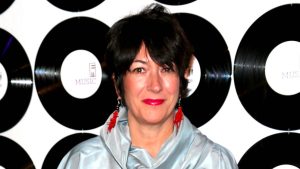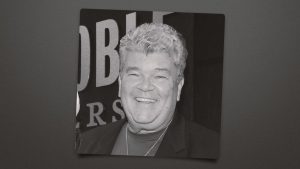
[This story contains MAJOR spoilers from The Handmaid’s Tale series finale, titled “The Handmaid’s Tale.”]
The Handmaid’s Tale delivered powerful endings for every character in the series, but perhaps none more poignant than for Serena Joy, played by Yvonne Strahovski.
Star Elisabeth Moss, who directed the finale titled “The Handmaid’s Tale” that began streaming on Tuesday, told The Hollywood Reporter that Serena’s ending may be her favorite of them all. “That scene kills me,” she said in a finale interview. “I can’t watch it without crying. Yvonne’s performance is magnificent. And she did it in one take. That whole speech when she’s talking to the baby. Yvonne had the idea that she wanted to get to this place of acceptance … You see this peace on her face where she realizes [son] Noah is all she needs. That’s all Serena ever wanted: Having a baby. It’s so perfect.”
That ending, however, was almost entirely different.
What viewers did see was Serena once again as a refugee. The series has put her in a similar position before, but this time, amid the fall of Gilead and Boston finally being free by the end of the series, Serena is stripped of her citizenship and she and baby Noah are sent temporarily to a center for refugees. She doesn’t know what awaits them next.
In a clever twist of writing from creator Bruce Miller, who penned the final episode, Serena is told that she has “a chair, table and a bed, all you need I guess.” Minutes later, the full-circle final scene features series protagonist June (Moss) returning to Serena’s former home, the Waterford house, to record herself saying, “A chair, a table, a lamp, and a window with white curtains…” It’s the voiceover that opened the series when June, then as Serena’s handmaid, assessed her sterile Gilead surroundings.
Miller has fed Serena scoops of karma before (the former elite Gilead wife became a handmaid in season five). But the show’s creator initially had a few more scoops in store. “I wanted to kill her,” he told THR flatly in a finale interview. “Because I think she was such a horrible person and being dead on the side of the road completely anonymously [after she was pushed from the train in the beginning of the final season] would have been a fitting end. I had to be convinced not to throw her off that train, along with the kid.”
It was season six showrunners Eric Tuchman and Yahlin Chang who pushed to change Miller’s mind.
“That would have been a very shocking opening for the season, and a realistic thing that might happen,” Tuchman, series writer since the show began, tells THR about Miller wanting to have Serena not survive the season six premiere. “But we felt strongly that there was more story for Serena, that there was much more we could explore, and to lose an actress like Yvonne Strahovski in the final season would have been a big mistake. She’s spectacular, and I think we did come up with a journey for Serena that concludes her story in a really powerful way. So everybody came around to that idea and she survived. She did get thrown off the train — and was banged up a bit! But she survived. And I think that was the right decision.”
Moss told THR that in her heart, she wanted to see Serena survive because she’s actually Serena’s biggest fan. “I’m her biggest supporter and defender. I want her to live. I just think she deserves that, and I think Noah [her son] deserves that,” she previously said.
Yang echoed those connections to both the character and to their actor.
“I did not want to do a season without Serena,” Yang, who joined the writers room in season two, tells THR. “She’s so essential to the show. I definitely did not want to be writing episodes that didn’t have Serena in them. We did wrestle [with Bruce about it]. The two of us [Yahlin and Eric] were tag-teaming and completely aligned in wanting Serena to survive and to keep her alive through the whole final season. We fought and fought [for her to survive], and it was a conversation that took months.”
Adding, “We just wouldn’t kill her. We kept coming up with stories and cool scenes for her. We just didn’t do it! (Laughs)”

Disney/Steve Wilkie
Strahovski says she was clued into the debate about Serena’s fate. “I was aware of the different places where [her death] might occur,” she tells THR. “Traditionally, I sit down with the writers ahead of each season to get an overview of what they have planned. I like to understand where we’re heading so that I can map out her emotional trajectory because Serena’s focus always changes depending on what she wants and how she wants to get it. I remember when I first sat down with Yahlin and Eric, they were leaning towards Serena’s death. At that point, it was a discussion of: Is she going to die in a blaze of glory? Or is it going to be super sad and lonely?”
Her reaction to hearing that possible arc might surprise viewers.
“To be honest, I thought the death was appropriate,” she says, reflecting on the idea of Serena not surviving the series. “If it was dramatic and awful and painful and tragic, I thought the audience would feel really satisfied while also feeling those complex feelings around rooting for her to join ‘the good side,’ as I’ve heard so many people say. I certainly felt like she had it coming, but where we actually end up is in a space that holds a lot more hope and maybe inspiration while also being really thoughtful and meaningful and really heartbreaking.”
Miller ultimately agreed with the co-showrunners. When it came to write Serena’s actual ending in the finale — when viewers see her cradling Noah in her arms, once again as a mother without a home — the scene changed slightly between conception and performance.
Miller had scripted a darker version of Serena’s ending, says Chang, where Serena was repeating like a mantra, “It was worth it. It was worth it. It was worth it.”
“In the end, [Noah is] all she has. It was partly like punishment: actions have consequences and here’s the consequence. Serena is a person who had big desires and big ambitions, and this is all she’s left with at the end,” says Chang. “Then when it goes through the actors and the directing [from star Moss], I think the scene ended up being a little more sweet.”
Strahovski says she didn’t know how she was going to play it until that day. “I decided that it needed to be hopeful while at the same time, a little bit devastating,” says Strahovski, who hadn’t yet seen the final cut, which Moss said she deliberately edited to be longer in order to showcase Strahovski playing Serena’s acceptance. “It felt like it was sort of a devastating scenario that Serena was going to hold onto this baby for dear life and sit in gratitude in this one moment where we say goodbye to her.”
When speaking to THR for a recent oral history on the series, Strahovski had opened up about feeling devastated to say goodbye to Serena, a feeling that took her by surprise. Though her final Serena-June scene in the series was of June forgiving Serena, she says the last scene she filmed was in the penultimate episode, when Serena gave June information that would lead to the deaths of High Commanders Nick (Max Minghella), Lawrence (Bradley Whitford) and Wharton (Josh Charles).
“June has always held out hope that Serena will change. She’s probably the one who has the most faith in Serena. So I did think that [June forgiving her] was possible,” she says. “[But after my final scene] it felt like, ‘Wow. That’s the last time I’m Serena.’ Taking the outfit off was so wild and weird to know that I’m not ever going to do that again.”
Reflecting on the deaths in the penultimate episode and the survival stories in the finale, Strahovski adds, “It feels powerful and appropriate to have the women survive in so many ways, versus the men, for this show about women. I’m sure Yahlin had a lot to do with that. But it is really powerful, and really sad and exciting. The ending is such a beautiful balance.”

Disney/Steve Wilkie
Tuchman agrees that Serena’s conclusion feels bittersweet. “One undeniable thing about Serena is her laser-focused desire to become a mother. She basically destroyed a whole country in order to have a baby. In the end, she’s stripped of everything. She has no country, she has no home. But she does have her son, and the essence of being a mother to this child,” he says. “She doesn’t have a happy ending, but she has the baby she’s always wanted and she is a good, loving mother. So I feel there is hope for her, like you want to feel for all the characters who survived. She’s alive, her child is alive. And together, they’ll find some future.”
In contrast to June’s complex ending, and how the series ends with the handmaid of The Handmaid’s Tale not reuniting with her daughter Hannah after six seasons, Serena’s ending could certainly be interpreted as more sweet than bitter.
Both Miller and Moss previously explained in their finale interview with THR how The Testaments, the forthcoming series adaptation of Margaret Atwood’s sequel novel to The Handmaid’s Tale, influenced June not getting Hannah back. In The Testaments, Hannah is still in Gilead, and that was an ending the series was setting up with its series finale. Chang and Tuchman shed more insight into that tricky task.
“We wanted June to get Hannah back. We really, really did,” says Chang. “We wanted the story to go there, but Margaret wrote this sequel and there was this other TV show that started [production]. Because of that, our hands were tied and we were not able to bring June and Hannah together. That was probably the biggest, hardest thing we had to deal with.”
She says they kept coming up with ideas for showing their reunion to the audience in some form. “Maybe we see a flash-forward of June and Hannah together in the future? But in the end, like Eric will say, we ended up with a very truthful ending to this show. We don’t pull punches,” she says. “There are probably a lot of people who are really mad at us about Nick[‘s death] and that he and June didn’t fly off to Paris together to live happily ever after. But it wouldn’t feel truthful. And so for this chapter of the story, June and Hannah just aren’t together yet. But that’s definitely something we wrestled with.”
Tuchman acknowledges that the happy ending they delivered was for Janine (Madeline Brewer), who reunites with her daughter, Charlotte, who had been taken from her. In the end, Aunt Lydia (Ann Dowd), with the consent of Gilead mother Naomi (Ever Carradine), reunites the biological mother and daughter. This sets Lydia on a new revolutionized course for The Testaments, where she will be the main character tying the two shows together.
“That certainly helps that we could reunite Janine with her daughter and for June to witness that — she’s there for that reunion,” says Tuchman of the complexity across Moss’ face as June watches Janine and Charlotte embrace. “Of course, that gives her such a heartache about not having her own child. But we do have that happy ending.”
The final scene was also another way to deliver on June’s love for Hannah. As she begins to record her tale — which viewers now realize is The Handmaid’s Tale that we’ve been watching — June imagines herself holding hands with Hannah while she’s sitting in her old room in the Waterford home after Boston is freed.
“When we were trying to figure out how to make the ending satisfying without reuniting June and Hannah, we came to the idea that June is telling her tale to Hannah and for Hannah,” says Chang. “Eric came up with the idea that you see pieces of imagined Hannah in that final scene. So there’s this feeling that everything you’ve been seeing, the whole story that’s unfolded, is all for Hannah. Even though they couldn’t physically be together, it’s like the entire show The Handmaid’s Tale is a gift; that story is a gift from mother to daughter.”

Disney/Steve Wilkie
When it comes to how they ended the show across the board for the ensemble, Chang says a theme was giving the finale a feeling of being like real life. “You don’t get every moment in your life tied up with a bow, because there’s always the next day,” she says. “It just happens that we dropped in on all these characters on this day and this is what happened that day. I think power comes from the fact that it feels so real. It doesn’t necessarily follow all the conventions of TV shows where everything’s wrapped in a bow at the end of the finale.”
Whether you think about Serena’s ending or June’s, the takeaway from the entire series is the same. “No matter how grim or bleak your circumstances, there’s always a light in the darkness,” says Tuchman of the show’s legacy. “You have to keep fighting and, never give up and never lose hope.”
Strahovski has a more difficult time putting a takeaway into words, particularly when it comes to Serena. “It’s hard to talk about her legacy without thinking of all the brutality, the cruelty. Legacy feels like it should be positive, and she leaves a lot of destruction.”
She continues, “I think my real [complicated] human emotions and feelings about Serena ultimately infused themselves into the role and that has perhaps created this emotional evolution of Serena and her journey. I could not help but feel empathy, and it’s almost like Serena didn’t want it to be there and shoved it away. But she definitely shows us that there is hope for change. June really personalizes it for her, as does her baby. Without that personalization, I’m not sure she would have gotten there.”
***
The Handmaid’s Tale finale is now streaming on Hulu. Read THR’s series oral history with the cast, creator and more, and our full series finale explainer with Bruce Miller and Elisabeth Moss.
#Handmaids #Tale #Killed #Serena #Joy #Finale #Debates






